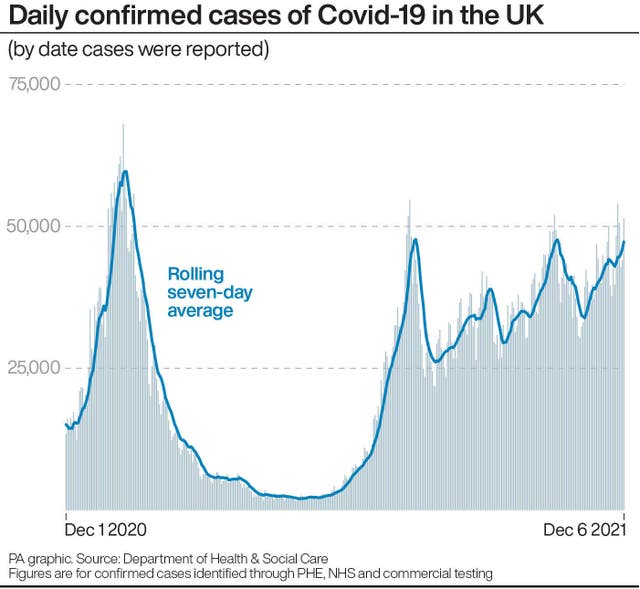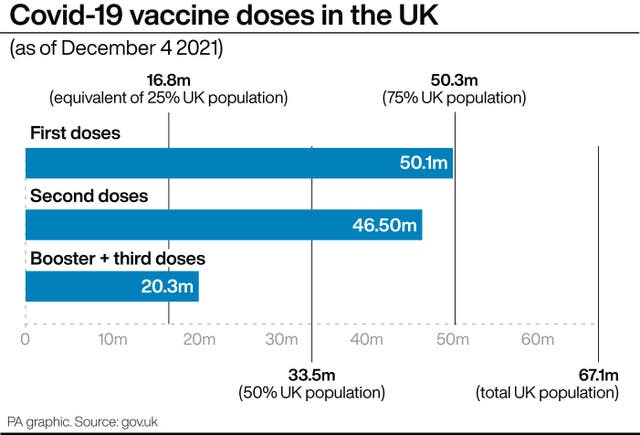
One of the nation’s top doctors has urged people to take up their jab offers to help the NHS make a dent in the backlog of care which built up during the pandemic.
There has been a “fairly constant” stream of around 6,000 Covid-19 patients in hospitals across England since the summer, but if more people take up the offers of vaccines then this figure would reduce and free up time for the NHS to make inroads into the backlog of care, according to Professor Stephen Powis.
In an interview to mark the anniversary of the first Covid-19 vaccine, the NHS England national medical director urged people to get boosters and first jabs, saying that “vaccines are our main way out of this pandemic”.
He told the PA news agency the NHS is under “intense pressure” but said he was “confident” the service would meet the target of offering all adults across England boosters before the end of January.

Asked about pressure in the NHS, Prof Powis said: “We have around 6,000 patients with Covid in hospital at the moment, and that’s been fairly constant since the end of July.
“There’s no doubt that the NHS is under intense pressure – those are 6,000 patients that we wouldn’t normally have at this time of year.
“And of course, we have additional beds closed because of the strict infection control measures that we quite rightly have to put in place in our hospitals.
“So it feels very busy. And it’s very busy in the NHS.
“And there’s a possibility that other infections such as flu might start to circulate more.
“So what’s really important is that you get that jab because the way the public can help us to reduce those numbers in hospital is to make sure that you have your first or second dose and of course, that all important booster, which recent data has shown is highly effective against preventing severe disease.”
The COVID-19 vaccine offer is evergreen and the best form of protection against COVID-19 ahead of winter.
Book yours today. https://t.co/9sMcRH23QP pic.twitter.com/RtR5dnKDqA
— NHS England and NHS Improvement (@NHSEngland) December 6, 2021
He continued: “NHS staff have been working hard to recover those services that have been disrupted and ensure that we start making inroads into that waiting list that unfortunately increased because of the pandemic.
“So in September, for instance, I think there were 1.3 million new elective cases started through our various elective pathways, and we are making inroads into it.
“But clearly, we want to avoid further disruption, that is the best way of ensuring that staff can get on with managing that waiting list.
“So once again, the key for the public is getting booster dose if you haven’t had your first vaccine, get it.
“Because that is what will reduce the number of people who unfortunately need healthcare because of Covid and that will give us the capacity to get on and deal with the backlog that has unfortunately arisen because of the pandemic.”

He said the NHS was in a “constant state of preparedness” and was carefully watching developments with the Omicron variant.
Prof Powis added: “We’re obviously watching Omicron carefully.
“I think most experts are now in a place where they believe that it’s likely to be more transmissible.
“We are not sure yet about how severe it will be – that I think will become clearer over the next few weeks.
“But it’s still the case that vaccines are the best defence against it, particularly that third booster dose, and even if it is able to evade some of the effects of vaccines, the booster dose provides that increasing antibodies in the blood will provide a degree of protection against changes in Omicron compared to previous variants.
“So the critical messages from the scientists and from the clinicians is ‘get your booster dose’.”
On the anniversary of the first vaccine being given, Prof Powis continued: “A year ago today I was in Coventry privileged to witness Maggie Keenan make NHS history as the first person to be vaccinated with an approved Covid-19 vaccine.
“It really felt like a moment of hope at the time, and I think that is still the case, because vaccines are our main way out of this pandemic.
“A lot has happened since, it is really quite remarkable: we are within days of 100 million jabs being given in England alone; we have given first doses, second doses, third doses, boosters, we’ve gone down all the adult age ranges, we started vaccinating children; we’ve had vaccination centres everywhere – we’ve jabbed in pharmacies, we jabbed in hospitals, we’ve jabbed in GP surgeries, but we’ve also jabbed in mosques, in sports stadiums, at festivals.
“This has been an absolute remarkable effort by NHS staff and volunteers.”
The NHS is getting ready to offer more people a COVID-19 booster vaccine, and will prioritise those at greatest risk.
The NHS will let you know when it’s your turn. If you are already eligible, book yours today. https://t.co/1e3nCAUFcB pic.twitter.com/a0qnB1SIO2
— NHS England and NHS Improvement (@NHSEngland) December 6, 2021
Prof Powis added: “Well, we have a target to offer boosters to everybody eligible by the end of January.
“And so we are once again mobilising a huge army of NHS staff and volunteers to to hit that target.
“We’ve done this before. And I’m absolutely confident that our staff and everybody who helps us throughout the vaccine programme will be up to the task again.”
He said it was “absolutely critical” for people to come forward when called for a vaccine.
“We know these vaccines are safe and highly effective, and they are particularly good at preventing severe disease.
“And with each jab, and particularly the booster job, you get that additional level of protection.
“So it’s absolutely critical that people come forward, when they’re called.
“It’s the best thing the public can do to protect themselves, their families, their loved ones, keep society as open as possible.
“And of course, help the NHS get on with all the other work that it’s been doing – by reducing the number of people who need to come to hospital with Covid.


Comments: Our rules
We want our comments to be a lively and valuable part of our community - a place where readers can debate and engage with the most important local issues. The ability to comment on our stories is a privilege, not a right, however, and that privilege may be withdrawn if it is abused or misused.
Please report any comments that break our rules.
Read the rules here